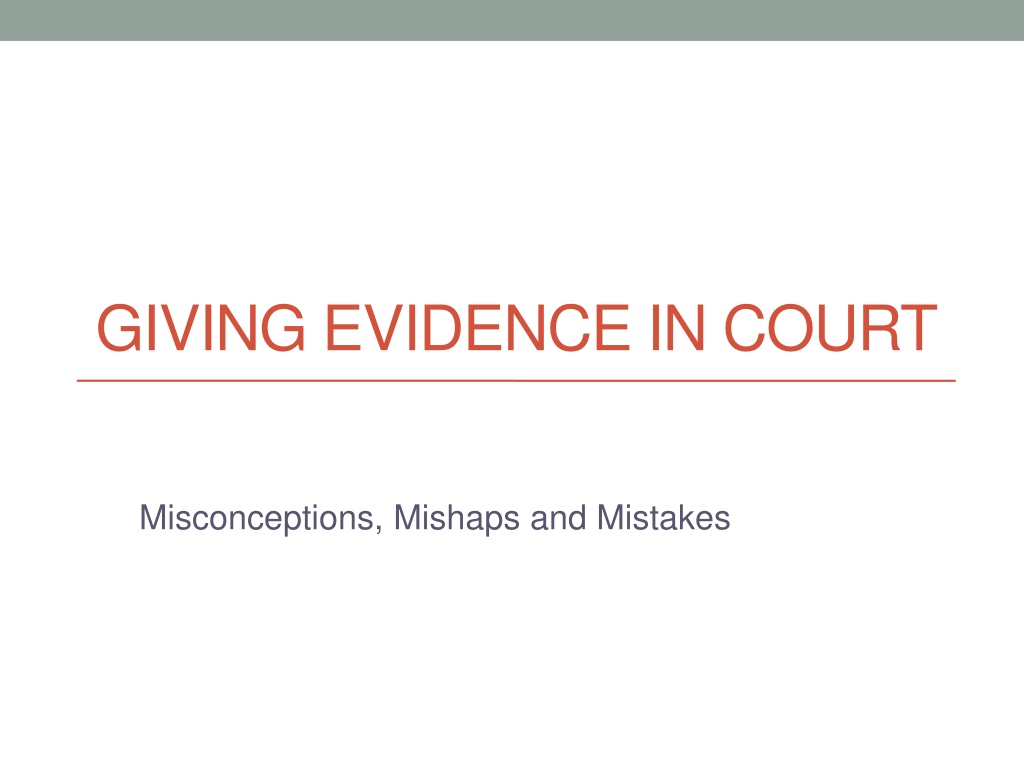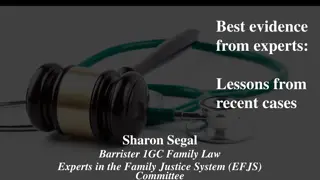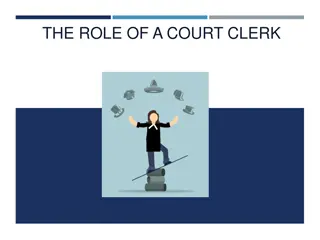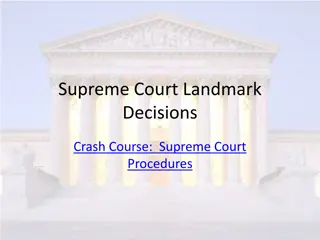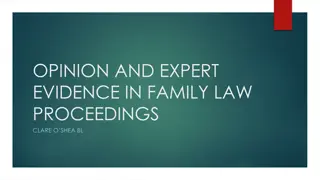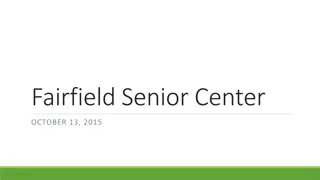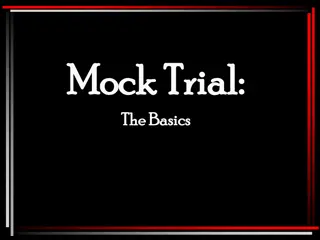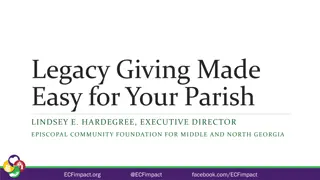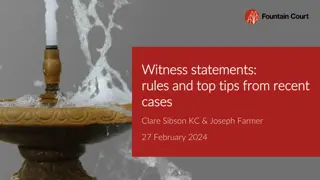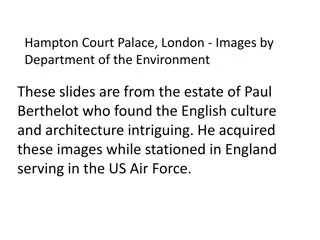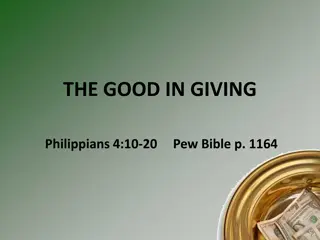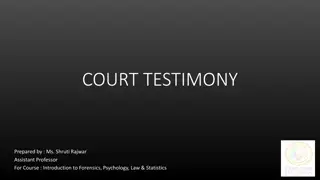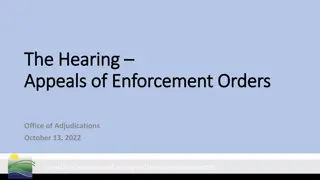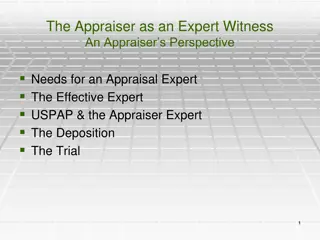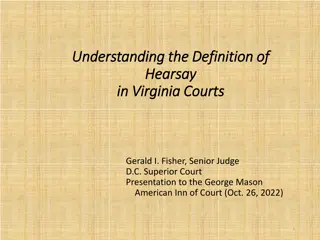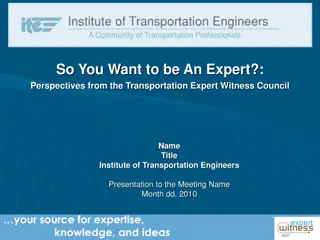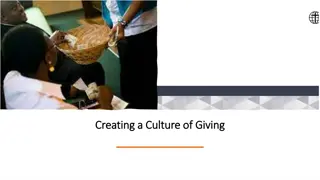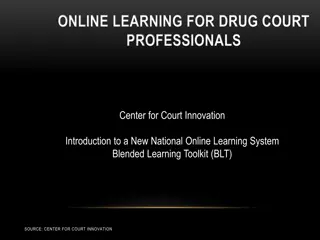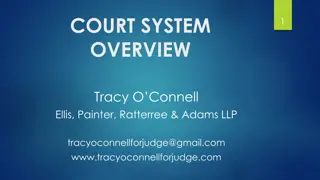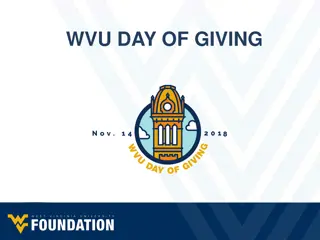Expert Witness Tips: Giving Evidence in Court
Gain insights into giving evidence as an expert witness with valuable tips on preparing for court appearances, handling cross-examinations, and understanding the legal process. Explore the nuances of providing evidence in chief, dealing with lawyers, and presenting your expertise effectively in court.
Uploaded on Sep 26, 2024 | 0 Views
Download Presentation

Please find below an Image/Link to download the presentation.
The content on the website is provided AS IS for your information and personal use only. It may not be sold, licensed, or shared on other websites without obtaining consent from the author.If you encounter any issues during the download, it is possible that the publisher has removed the file from their server.
You are allowed to download the files provided on this website for personal or commercial use, subject to the condition that they are used lawfully. All files are the property of their respective owners.
The content on the website is provided AS IS for your information and personal use only. It may not be sold, licensed, or shared on other websites without obtaining consent from the author.
E N D
Presentation Transcript
GIVING EVIDENCE IN COURT Misconceptions, Mishaps and Mistakes
DINGLEY v CHIEF CONSTABLE Can trauma cause MS ? 1996 Yes - No - No. Legal proof and scientific proof. Expert medical evidence from around the globe. Medical witnesses in court.
WHERE TO LOOK FOR ADVICE GMC BMA EXPERT WITNESS INSTITUTE COURT RULES COPFS THE INTERNET ( EVERYWHERE)
I AM AN EXPERT TOO Report and Joint report Appearing as a witness in court is alien and unfamiliar. You don t really know the context You might be cited at the last minute. What s up ? You are going to be cross examined. Concentrate on being brief. Why was I cited to attend ? Did I do well ? What happened to the case ?
QUESTIONED IN COURT The judge knows nothing The lawyers present what evidence they want to present. Pursuer (claimant) usually leads evidence first. Calls all witnesses they want. Defender(s) call all witnesses they want or none because the court has not heard anything that proves the case. Examination in chief - the story. Cross examination - the dodgy bits. [NITA] Re-examination - explaining the dodgy bits.
GIVING EVIDENCE IN CHIEF pre court Papers and records Your report Other reports What are the Issues ? Informal report or discussions pre- proof Documents available in court ? Resources. Illustrations.
EVIDENCE IN CHIEF IN COURT Your function Your story Your expertise Your report(s) Non leading questions only, but if not controversial OK Judge may not have read anything in advance. Look at the questioner Direct answer to the judge If you don t understand don t guess If you don t know just say you don t know. Don t anticipate the next question. Short answer if need more, then you will be asked
Evidence in chief - your lawyer Your lawyer Good one or not so good one. Clear slow explain. Your audience Concentration Clarity Simplicity DO NOT PATRONISE/SCOFF/JOKE/GET ANNOYED.
CROSS EXAMINATION LISTEN THINK ANSWER KEEP IT SHORT EXPLAIN IF ASKED ASSIST THE COURT SPEAK TO THE JUDGE
HOW AM I GOING TO ATTACK YOU ? CROSS EXAMINATION I am going to look you up on the Internet. I am going to ask people about you. I am going to read about your expertise and speciality I am going to get my expert to give me hard questions to ask you. I am going to point out your sloppy report writing I am going to talk about facts and assumptions you have made. I am going to annoy you. I am going to be nice to you I am going to be really well prepared I am going to spend hours on picking the right question(s) I am not going to let you divert me from what I want. I know what I want from you I am going to get it I am in control. IT IS NOT PERSONAL.
CROSS EXAMINATION - trick questions Have you ever been wrong/made a mistake ? Just answer Yes or No If you were to argue for the other side what would you say ? Have you done expert witness training ? Why ? Left field questions. Do you know the other expert? Have you discussed your opinion with anyone ? Silly mistakes in the report. Convoluted questions - NB. Could you repeat that ? Multiple questions ? I may be stupid but....
SO....what do judges think ? ....in assessing expert evidence courts should have regard to the explanations that are given for the views advanced, rather than to the mere fact that a view is widely held, or the apparent distinction of the person expressing the view. ..[The court is]... .entitled to apply ordinary standards of logic and common sense. Critical assessment of the reasoning underlying expert evidence, and of the premises on which it is based, is essential. In that, sometimes, fevered process, mistakes can be made, ill- considered assertions volunteered or analogies drawn by the most seasoned court performers, whatever their role.
ITS ALL ABOUT YOU Professor A s .. approach to those who disagreed with him tended to be brusque. He suggested that those people who reject his approach either had not read the relevant papers, or do not understand them. He commented: personal dislike, or ignorance, of new evidence should not be confused with scientific debate. He speculated that certain elderly clinicians did not accept his views, because they were not prepared to accept new evidence. I found it surprising that Professor A thought it necessary to make such ad hominen comments. They struck me as being contrary to the scientific approach that he strongly advocated.
How to mess it up ? Dr. J. was a conscientious and experienced consultant...his expert evidence is so flawed that I cannot rely on..it. Giving evidence in court is stressful...and doing so when one s professional opinion is being challenged is doubly so...on several occasions (he) started laughing at propositions put to him ..and ..had a habit of lapsing into lecture mode... The opinions of an expert doctor who has so strikingly demonstrated no real knowledge or proper understanding of the claimant s extensive...pre accident history ..are of little or no value..
...and keep messing it up.. Dr. J was neither careful nor forensically thorough...did not ask for missing records (or even notice that they were missing).. ...or qualify his conclusions.. Dr. J put forward several plainly absurd propositions.... Dr. J was dismissive of those who did not agree with his rigidly held opinions.... .....in terms that were at best off hand and at worst rude.
even more... He described contrary opinions as ..absolute rubbish and nonsense.... ..... ...dogmatic approach..inconsistent with the obligations of an expert witness. The content of his evidence was combative and he acted as an advocate for the claimant..... Lack of balance...sidestep a question and respond with an argument to support the claimant....
OBJECTIVE I detected in his manner a reluctance to acknowledge what plainly were errors in his account and a tendency to present his refreshed memory in a way as helpful as possible to the Defendant's cause. With the exception of Dr B.., I am firmly of the view that their failures of memory were no more than the consequence of the passage of time and the difficulty of reconstructing events whilst standing in the witness box. I detected no attempt by any of them to trim their evidence to fit a pre-determined narrative.
CONFERRING WITH LAWYERS ..When I say persuaded, I don't mean someone pinned me against a wall, I mean that over a period of time I was persuaded, I persuaded myself... I am somewhat troubled by ..the account of Mr C. being persuaded or persuading himself ...., his making value judgments about what would be the better case to plead, and his including in a report ..an opinion which he thought it would not be unreasonable to advance. In my judgment the role of the expert witness is to provide expert evidence on the issues he is asked to address, rather than to concern himself with the conduct of the litigation. There is..no evidence of any impropriety on the part of either counsel or solicitors for the Claimant in their contact with Mr C.. I accept that it is perfectly proper for legal representatives to discuss with expert witnesses the contents of their reports. It is proper for a legal team to invite an expert to consider the evidence that has arisen and to reflect on the effect of that on his opinion. There is nothing to suggest anything beyond that was done here.
INDEPENDENT While some degree of consultation between experts and legal advisers is entirely proper, it is necessary that expert evidence presented to the court should be, and should be seen to be, the independent product of the expert, uninfluenced as to formal content by the exigencies of litigation. ..
FORCEFUL Dr R..expressed his opinion to me in firm terms, ...There were answers given by him which contained a degree of hyperbole and might have been expressed in more measured terms. But I see nothing improper in an expert expressing himself forcefully if it is his genuine view that that is what the questions require. I regarded Dr R.. as an impressive and entirely credible witness.
CONNECTION [Counsel]...makes complaint about the nature and extent of Mr J' s connection with the ...Hospital. It is right to say that Mr Jarvis had been a registrar at this hospital ... However, Mr J. made it clear at the very beginning of his report that that was the position and I see no possible basis for criticism of him, his having made that declaration on first being instructed. [Counsel] also referred to the observations of [the judge in a prior case] ..where Mr J..was described as a most unsatisfactory expert witness , who appeared to forget his duty to the court and seemed illegitimately to stray into advocacy for the Claimant's cause ..In my judgment, Mr J.did not make a similar mistake in this case. He maintained his opinion as to the propriety of the Defendant Hospital's conduct ..but he did not, in my judgment, stray into becoming an advocate for them.
THE RECORDS 11 The records ..have proved unusually difficult to interpret. A number of recordings of readings relating to particular time periods were begun on one page, but completed on a different page, often without the entries on one page flowing seamlessly from hour to hour and day to day such that the one page naturally followed the other. An unfortunate consequence of this has been the expression of developed views by the experts on both sides of the argument in the light of that which they understood sometimes wrongly to be the data.
DONT GET STUCK Though expert witnesses must be expected to moderate their views in the light of different information, ..I have also to recognise that even for those who have the objectivity of most experts there may be a reluctance to change or moderate a once firmly expressed view. A court has to be alert to this.
CONFLICT OF INTEREST Our adversarial system depends heavily on the independence of expert witnesses, on the primacy of their duty to the Court over any other loyalty or obligation, and on the rigour with which experts make known any associations or loyalties which might give rise to a conflict. Dr M.. failed to do so here, ...Indeed, the omission of mention of (controversial) papers co-authored with Dr B.. points in the other direction. In circumstances such as those arising here, the scrupulous expert ..should be pointing out the problem to the legal team well ahead of trial. No doubt that will usually be done in privileged communication. ...
ASSUMPTIONS The claimant's expert (X) did not address the defence case anywhere in his report nor did he engage with it adequately in the joint expert statement. He therefore proceeded on an assumption as to how the injury occurred without any reference to what was pleaded in the defence or the evidence as to what actually happened, at the very least..he had not read the material before him with the appropriate degree of care or asked the questions one would have expected him to obtain clarification.
MAKING IT UP AS YOU GO ALONG That intransigent mindset coloured his evidence throughout, and in a manner unhelpful to the court. X had been criticised by ..in another case five months earlier with regard to making factual assumptions without verifying their accuracy. That made his failure to carry out basic checks in the instant case all the more surprising. His fundamental misapprehension as to how the injury was sustained meant that the first time he addressed the defence case was in cross-examination. Further, X had introduced two new possible mechanisms of the injury during cross-examination, which the defendant's expert considered to be implausible. No reliance could be placed on those hypotheses to make a positive case as to how the injury occurred.
MEASURED AND CAUTIOUS I have identified the numerous occasions in the course of his cross-examination where Dr W..was obliged to withdraw or qualify important and unjustifiable observations in the written reports. ..Dr W..lost the objectivity that is essential for a witness who is requested to provide independent expert evidence to the court. Particularly damaging, in my view, was his willingness to enter into areas where he lacked any valid expertise. he was prepared to express his opinions in terms which left no room for doubt that ..J .. was a malingerer (in the broad and pejorative sense of being someone who was knowingly feigning his disabilities in order to promote a fraudulent claim). .. I preferred the measured and cautious approach of Dr P.. to the more dogmatic and frequently unjustifiable approach of Dr W..
